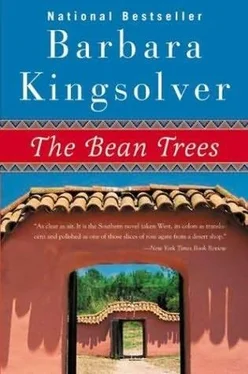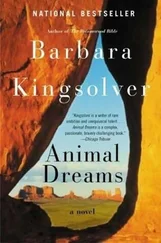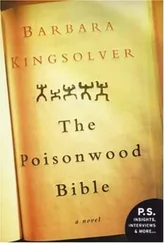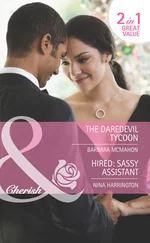Barbara Kingsolver - The Bean Trees
Здесь есть возможность читать онлайн «Barbara Kingsolver - The Bean Trees» весь текст электронной книги совершенно бесплатно (целиком полную версию без сокращений). В некоторых случаях можно слушать аудио, скачать через торрент в формате fb2 и присутствует краткое содержание. Жанр: Современная проза, на английском языке. Описание произведения, (предисловие) а так же отзывы посетителей доступны на портале библиотеки ЛибКат.
- Название:The Bean Trees
- Автор:
- Жанр:
- Год:неизвестен
- ISBN:нет данных
- Рейтинг книги:5 / 5. Голосов: 1
-
Избранное:Добавить в избранное
- Отзывы:
-
Ваша оценка:
- 100
- 1
- 2
- 3
- 4
- 5
The Bean Trees: краткое содержание, описание и аннотация
Предлагаем к чтению аннотацию, описание, краткое содержание или предисловие (зависит от того, что написал сам автор книги «The Bean Trees»). Если вы не нашли необходимую информацию о книге — напишите в комментариях, мы постараемся отыскать её.
“A LIVELY NOVEL… AN EASY BOOK TO ENJOY.”-The New Yorker
“LOVELY, FUNNY, TOUCHING AND HUMANE.”-Kirkus Reviews
“A SPIRITED, WARM BOOK, WRY AND AT THE SAME TIME REFRESHINGLY GUILELESS.”-Ella Leffland
***
Taylor Green becomes the guardian of an abandoned baby girl she calls Turtle. In Tucson they meet the proprietor of an auto-repair shop with a safe-house for Central American refugees upstairs and there she builds a life for herself and her child.
The Bean Trees — читать онлайн бесплатно полную книгу (весь текст) целиком
Ниже представлен текст книги, разбитый по страницам. Система сохранения места последней прочитанной страницы, позволяет с удобством читать онлайн бесплатно книгу «The Bean Trees», без необходимости каждый раз заново искать на чём Вы остановились. Поставьте закладку, и сможете в любой момент перейти на страницу, на которой закончили чтение.
Интервал:
Закладка:
On her way out the nurse gave her a pamphlet with a special diet written out in both English and Spanish. She thought about asking for a second copy to send to her mother. After four years Lou Ann still felt that she had to prove her point about Mexicans, and so she would send clippings from the newspaper when they were promoted to company vice presidents and such. Lou Ann realized, though, that this pamphlet didn’t fall into that category. Her mother was no doubt already convinced that Mexicans had babies like anyone else. In fact, she had told Lou Ann that from what she heard they had too many, that they were trying to take over the world like the Catholics.
Lou Ann hadn’t yet broken the news that, when the baby was born, the plan was to give it a Catholic baptism. This would be for the sake of Angel’s mother, who frequently claimed to be dying from any one of various causes. The only English words she knew were the names of diseases. Lou Ann made the baptism decision purely for practical reasons: if one of the grandmothers was going to have a conniption, it might as well be the one who was eighteen hundred miles away rather than the one who lived right across town.
Lou Ann looked over the pamphlet while she waited for the bus. Like most of the other literature she had received, it had a picture on the front of a mother holding a baby. Sometimes the women in the pictures were white, sometimes Mexican, and sometimes black. They were shown holding their babies in various positions, but they were never shown as pregnant. Lou Ann wondered about this, since all the pamphlets were about prenatal care.
On the bus she decided it must have to do with the fact that the pamphlets were put together by men, who in her opinion liked the looks of a mother and baby better than a pregnant woman. She was fairly sure about this. On the bus, for instance, several men would stand up to offer her a seat, but they wouldn’t quite look at her. The high school boys didn’t make remarks under their breath or try to rub up against her when the bus made sudden stops and turns. To be able to relax this way on a crowded bus was a new experience for Lou Ann, and she thought that in some ways it would not be so bad to go through your life as a pregnant lady.
She watched the houses and telephone poles go sailing by. Some of the telephone poles had advertisements for Tania Maria, a woman leaning forward in a loose sweater and spike heels. She was a singer, and had enough hair for at least two people. Other telephone poles had black posters with letters that appeared to be cut out of a newspaper, like the ransom notes in mystery novels, but they were ads for bands with names like Audio Confusion and Useless Turmoil and the Meat Puppets. She thought of naming her baby Tania Maria. Angel would suggest naming it something like Meat Puppet. That would be his idea of a joke.
It was pure pleasure not to have men pushing into her and touching her on the bus. It allowed her mind to drift far away from her strange, enormous body. When she was nine her Grandfather Ormsby had given her a jackknife, and had told her that for safety’s sake she should always keep a magic circle around her when she used it. She would sit in the backyard and draw a circle in the dirt that no one could come into while she whittled for hours and hours on thick brown bars of soap. The jackknife was long gone now, but once again there was something like a magic circle around her.
She got off at the Roosevelt Park stop, which was a half block from the park itself. Sprawled over the large corner lot was a place called Jesus Is Lord Used Tires. You couldn’t make a mistake about the name-it was painted in big, cramped blue letters over the door, with periods inserted between the words: JESUS.IS.LORD.USED.TIRES. On the side of the pleated tin building there was a large picture of Jesus with outstretched hands and yellow streamers of light emanating from His head. There was also a whitewall tire, perhaps added to the mural as an afterthought and probably meant to have no direct connection with the Lord, but it hung in the air below His left hand very much like a large yoyo. Jesus appeared to be on the verge of performing an Around the World or some other fancy trick.
Top-heavy, chin-high stacks of Firestones and Michelins at the edge of the paved lot formed a wall between Jesus Is Lord and a combination nightclub and pornography shop next door called Fanny Heaven. There was no mistaking this place either. The front windows were whitewashed, and large signs painted over them declared GIRLS GIRLS GIRLS on one side of the door and TOTAL NUDITY on the other. On the front door of Fanny Heaven was a life-size likeness of a woman with long red hair and a leopard-skin bikini. Public art of various types was popular on this block.
Lou Ann walked past both of these establishments nearly every day. Something about the Jesus Is Lord place reminded her of Kentucky, and she always meant to ask (if she only had the nerve) if the people there came from her part of the country. Fanny Heaven she just tried to ignore. There was something innocent and primitive about the painting on the door, as though the leopard-bikini lady might have been painted by a schoolchild, except that she was positioned in such a way that the door handle, when a person pushed it, would sink into her crotch. This door always gave Lou Ann the shivers, though she tried not to give it a second thought.
She rounded the corner and stopped to do some grocery shopping at the Lee Sing Market, which faced the park directly across from where she and Angel lived. She bought most of the items recommended by the diet pamphlet, but some of them, like yogurt, were too expensive. She bought a package of macaroons because they were Angel’s favorite.
The Chinese woman at the cash register was Lee Sing. Her mother, who was said to be more than one hundred years old, lived with her in the back of the store. Lee Sing told Lou Ann she was going to have a girl. “She’s high, up here,” Lee Sing said, tapping her bony fist above her stomach. She said this to Lou Ann every time she came in.
“Either way is okay with me,” Lou Ann said, although she was somewhat curious to see if Lee Sing would be right.
Lee Sing shook her head as she rang the cash register, and muttered something that sounded to Lou Ann like “New Year pig.”
“Beg your pardon?” Lou Ann was a little afraid of Lee Sing, who often said peculiar things like this.
“Feeding a girl is like feeding the neighbor’s New Year pig. All that work. In the end, it goes to some other family.”
Lou Ann felt offended, but didn’t really know how to answer. She was a long way from her own family in Kentucky, but she didn’t see this as being entirely her fault. And it wasn’t as if her brother had stuck any closer to home, either. He had gone north to work on the Alaska Pipeline and had married a Canadian dog trainer. They had four daughters with Eskimo names that Lou Ann couldn’t keep straight-things that sounded like Chinook and Winnebago.
Outside it was beginning to get dark. Lou Ann crossed the park in a hurry, skirting around an old wooden trellis where several transients were congregating. As usual she tried to concentrate on not being afraid. Angel had told her that some people, like dogs, can smell fear.
When she got home she saw that Angel had already been home from work and had left again, for good. She was confused at first and thought they had been robbed, until she began to see a pattern to what was taken. She wandered around the house with her grocery bag looking at the half-empty house. After four years there was very little, other than clothes, that she thought of as belonging clearly to one or the other. In a strange way she was fascinated to see what he had claimed for his own. It revealed more to her about his personality, she thought, than she had learned during their whole marriage.
Читать дальшеИнтервал:
Закладка:
Похожие книги на «The Bean Trees»
Представляем Вашему вниманию похожие книги на «The Bean Trees» списком для выбора. Мы отобрали схожую по названию и смыслу литературу в надежде предоставить читателям больше вариантов отыскать новые, интересные, ещё непрочитанные произведения.
Обсуждение, отзывы о книге «The Bean Trees» и просто собственные мнения читателей. Оставьте ваши комментарии, напишите, что Вы думаете о произведении, его смысле или главных героях. Укажите что конкретно понравилось, а что нет, и почему Вы так считаете.












